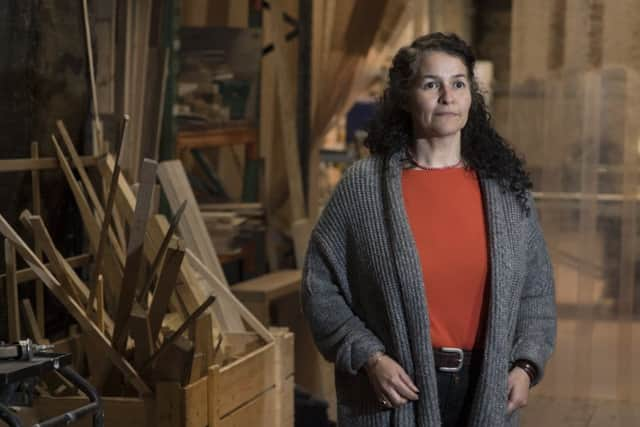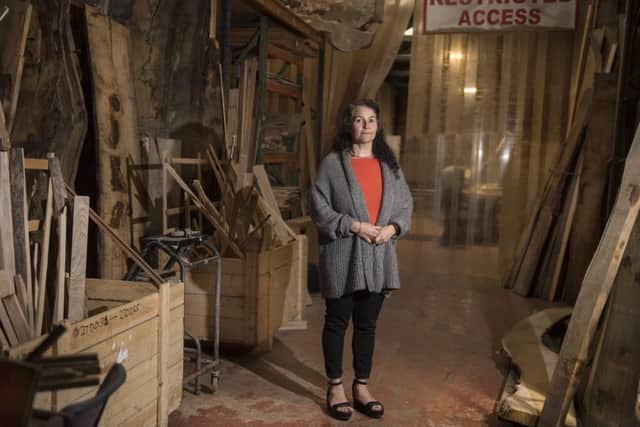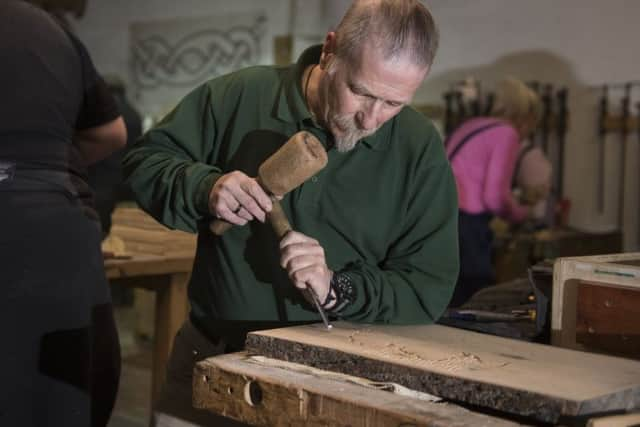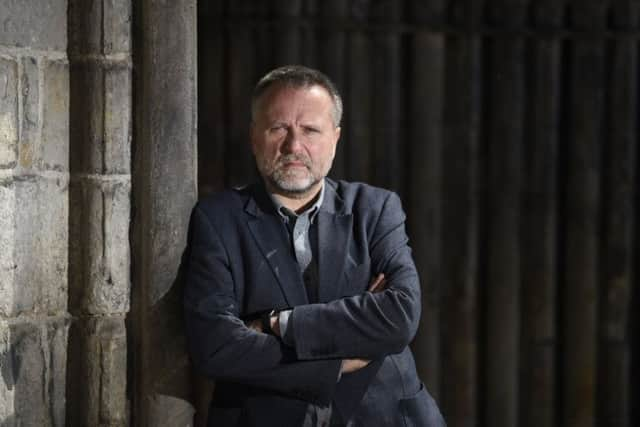Insight: What tips men over the edge of despair?
Raymond Soltysek was only five years old when he first felt something going “wonky” in his mind. “I was walking home with a wee girlfriend and I just remember my head physically filling with something black, like a cloud or oil,” he says. “I snapped at her. I think I just wanted her to shut up, I think, or the world to go away.
“I felt immediately scalded by my reaction; I didn’t know where it came from. People have said to me since ‘maybe you were just pissed off with her’, but the physical sensation was powerful and vivid enough for me to remember it all these years later.”


Advertisement
Hide AdAdvertisement
Hide AdNot that Soltysek told anyone at the time; he internalised his feelings then and in his late teens, when, over a period of nine months, he would curl up in the corner of his bedroom or spend nights out with his friends, but not speaking them.
It wasn’t until he was 40, after protracted periods of depression had contributed to the breakdown of a long-term relationship, that he finally sought help; and another 20 years before he was given any treatment other than anti-depressants.
For a long time, he kept on working. “I think that’s something else men do: they find coping strategies,” he says. “For me, the roles and structures of work acted as a scaffold. I could concentrate on the task at hand, but at night I would fall apart.”


Around three years ago, however, Soltysek, 59, a writer, teacher and educationalist, whose short story collection Occasional Demons was shortlisted for the Saltire First Book Award, suffered another, deeper crisis and began having obsessive thoughts.
“Sometimes it’s little things that tip you over the edge,” he says. “In this case it was my car breaking down. I found myself for a whole night awake, anxious, panicking, almost contemplating ending it all. I had this vision of myself and I thought: ‘What the f*** are you on about – your car’s broken down and you think your life is over? Come on.’” It was this moment of clarity that pushed him to take time off and go back to his doctor’s surgery, where he couldn’t stop crying. His GP signed him up for Cognitive Behavioural Therapy (CBT) and a support group where, for the first time, he was able to open up to other people who had been through similar experiences.
It was a relief to share stories, even if some of the conversations were painful. “I had never thought of myself as suicidal,” says Soltysek, “but one day I heard myself saying: ‘If I lived in an American gun culture, I would be dead by now.’ All the men around the table nodded because we had all experienced moments of desperation when we just wanted to get the f*** out of there.”


What is it with men?
That’s the question those who work with mental health charities have been asking themselves for decades. Why is it that, even as the stigma around depression gradually lifts, so many of them continue to find it difficult to admit they are struggling?
Across the developed world, more women are treated for mental health problems than men. In 2013, an analysis of epidemiological studies from the UK, US, Europe, Australia and New Zealand found women were 75 per cent more likely than men to report depression and 60 per cent more likely to report anxiety disorder. Despite this, or maybe because of it, more men engage in substance abuse and take their own lives.
Advertisement
Hide AdAdvertisement
Hide AdIt is important not to generalise when talking about mental health and suicide: only a small proportion (5 per cent) of those who are being treated for depression kill themselves and part of the reason more men do so than women is because, when they attempt to harm themselves, they use more lethal methods.


Nor does being able to talk about your feelings of despair guarantee they will disappear; one of the reasons the suicide of Frightened Rabbit singer Scott Hutchison hit so many people so hard was that he had been admirably open about his own despair in his lyrics and his interactions with fans.
Still, you can’t get away from the statistics. Last year in Scotland, 517 men took their own lives compared with 211 women, with the overall total rising for the first time in a decade. In recent years, the group most at risk has shifted from young men to men aged between 35 and 54. Suicide is the leading cause of death for men aged between 20 and 49.
Not enough is known about the reasons for this because, despite the high stakes, there is a dearth of studies. “For every person affected, the UK government spend 22 times more on cancer research than on research on suicide,” says Professor Rory O’Connor, of Glasgow University’s Suicide Research Lab. “It’s a national and international disgrace.”
In 2012, however, the Samaritans’ Men and Suicide report did identify a range of contributing factors. Some were gender-neutral: they included particular personality traits and socio-economic problems, such as deprivation and job losses. Others, however, were linked to masculinity: men, for example, were more likely to use drugs and alcohol to cope with stress and to take their own lives if their marriage failed. Their “emotional illiteracy” also meant they were more likely to be sceptical about the value of counselling and to seek help only when they had reached breaking point.
Although her partner, Chris*, did not take his own life, Lucy* believes his refusal to talk about his anxiety and depression played a part in his death last year from a heart attack at the age of 47. Throughout the 10 years they spent together, there were long periods where he would retreat into himself. “When he didn’t feel well he would close himself off to me; he would drink about eight cans a night for six nights of the week and smoke a lot of dope,” Lucy says. “He had good phases. He was funny and a dedicated dad and sometimes he would get pleasure out of the confirmation work gave him. But other times, he felt out of his depth. He would suffer a lot of anxiety which would result in him not sleeping. And his lack of self-confidence meant sex no longer existed for us.”
Despite Lucy’s pleading, Chris would not go to the doctor; around a year ago she found him dead in their bathroom. “I think it would have been absolutely key for his survival if he could have opened up. But he wouldn’t admit there was anything wrong even though it was screamingly evident.”


After years of not acknowledging his problems, Soltysek yesterday shared his thoughts on masculinity and mental health with an audience at a Flint & Pitch Productions spoken word event in Edinburgh. He believes the idea that men should not talk about their emotions is so hard-wired, they lack the mechanisms to initiate those kinds of conversations.
Advertisement
Hide AdAdvertisement
Hide Ad“When we were wee, we used to play cowboys and Indians. We would rush about going rat-a-tat-tat at each other and it was all very active and macho; and talking about that kind of thing – you just didn’t do it,” he says.
“When I was in my late teens, my wee sister used to beg me to tell her what was wrong and I couldn’t because I didn’t know how. It wasn’t that I was afraid to show weakness, it was more that I lacked the internal resources. I did not have the ability to say: ‘This is what’s wrong. This is what I am feeling.’”
Dr Malcolm Harvey, a teaching fellow in politics at Aberdeen University, who also suffers from depression, has never felt constricted by stereotypes of masculinity, but believes changing gender roles can make men feel they are failing on all fronts.
“My father and father-in-law very much belong to the generation of the male breadwinner, with the women at home looking after the kids. I am not of that mentality and I hate to complain about these things because it’s the fault of the patriarchal system that women have been trapped in these positions for so long. But I do think the challenges of trying to balance those kinds of expectations with the expectations of the 21st century, the millennial-type attitudes towards feminism, for example, can contribute to the pressures men are under.”
For Harvey, those pressures manifested themselves in a creeping sense of inadequacy. “One of the things I found difficult was that whenever I was at work, I felt I wasn’t doing enough at home, and whenever I was at home, I felt I wasn’t giving enough to the job, so consequently I spent the entire time wishing I was somewhere else. That’s not a healthy mindset,” he says.
Harvey’s depression is not, he says, at the severe end of the spectrum, but his feeling of “not being enough” resonates with O’Connor, who has been working in this field for more than 20 years. Though the greatest risk factor for suicide is social inequality, O’Connor agrees the way in which the social role of men has changed combined with their continued reluctance to seek help may feed into the disproportionately high rates of men taking their own lives.
“One area we have done a lot of work on is ‘social perfectionism,’” he says. “The challenge for men who are social perfectionists is that there are opportunities for failure every single day. You can see how you can get into this vicious cycle of thinking you are letting everybody down.
“There is also some evidence that today’s middle-aged men are the buffer generation: they look to their parents, their fathers, in particular, who had this traditional role. They look to their kids coming up behind them who are much more at ease in talking about their emotions and embracing this changing social role. They are in the middle and they struggle with it.”
Advertisement
Hide AdAdvertisement
Hide AdOf course, there is little point in encouraging men to open up about their mental health unless the system is capable of offering them support when they do. This was the point some people were trying to make after Hutchison’s death prompted a flurry of well-intentioned tweets telling men they shouldn’t suffer in silence.
“It’s all very well telling people who are ill to talk about it, but then you have to have people who are ready to listen,” says Harvey. “I think on this we are massively far behind where we need to be.”
The Scottish Government insists it is investing more heavily in mental health than ever before. In 2017/18, its expenditure rose above £1bn for the first time; in 2016, it appointed Maureen Watt as a dedicated minister for mental health; last year it launched a 10-year mental health strategy and its suicide prevention policy will be published later this year.
Yet according to Billy Watson, the chief executive of the Scottish Association for Mental Health (SAMH), the targets for waiting times, which at 18 weeks are already longer than those for physical illnesses, are frequently missed, with people in some parts of the country having to wait years rather than months to access therapy.
“It’s wonderful to see in the opening paragraphs of the mental health strategy that the Scottish Government and the mental health minister are seeking parity with physical health, but I think there is a significant gap between the strategic intent and implementation on the ground,” says Watson.
“The government still allocates resources to health boards and local government based on the NRAC formula and the majority of that funding is per capita – in other words, it doesn’t specifically target areas with the highest need though we know mental health is affected by inequality and social determinants.
“We have given evidence to the Scottish Parliament that comparatively, in resource terms, mental health in Scotland is actually behind England and other places in the UK.”
Though O’Connor says Scotland has led the way in suicide prevention, the Samaritans recently cited a poll in which 40 per cent of people said they would not know where to turn if they were supporting someone in crisis as evidence that prevention was not a “top priority” here.
Advertisement
Hide AdAdvertisement
Hide AdCertainly, the experiences of the men I spoke to about mental illness were mixed; the service varied from health board to health board and from surgery to surgery, with the quality of the response often dependent on the individual GP. Soltysek, who spent 12 years on Citalopram, believes the fact he was “functioning” meant he was never seen as a priority for therapy. “I kept going back to the doctor and saying: ‘What’s the route map off the medication?’ But there didn’t appear to be one. Eventually, I made the decision to come off the medication by myself.”
Kenneth Caldwell, 52, who has been hospitalised several times for severe anxiety and depression, says stays in Gartnavel Hospital in Glasgow and Dykebar Hospital in Paisley involved long periods of time with nothing to do. “On two occasions, thanks to money from a relative, I ended up at the Priory where there was CBT and other counselling sessions. It gave the days structure,” he says. “I am not maligning the NHS because I know it comes down to resources and with the Priory came a price tag of £4,000 a week.”
Another man, Simon*, whose childhood trauma led to flashbacks and a breakdown, told me how, unable to afford the £300-£400 a month to go private, he waited a year for his Eye Movement Desensitisation and Reprocessing Therapy that is now – finally – proving transformative; in the interim he had to rely on counselling from a local charity.
Increasingly, third sector organisations and charities appear to be acting as safety net for those people whose resources do not stretch to private treatment. Yet those charities are often themselves under pressure as a result of funding cuts.
At GalGael in Govan, around 10 men and a handful of women are sawing, chiselling and sanding pieces of wood to make boxes and chopping boards. The air is thick with the aroma of freshly cut timber; there are wood shavings on the floor, stag’s heads on the walls and the carved faces of Green Men peer out from dusty corners. In the middle of the room is a half-built skiff which will eventually be given to a local rowing club.
Among the volunteers is Johnnie Millar. At 65, he is a testament to the way men’s lives can collapse if the structures that underpin them are removed. For 36 years, Millar worked for a light engineering company. But around 10 years ago, and six months after his marriage ended, he was made redundant. He got another job, but then the credit crunch hit and he lost that too. “It was as if every structure I had in my life had been taken away,” he says. “I had to move out to a small flat – it was cold, I was isolated. I couldn’t see any light at the end of it all.”
Millar becomes distressed when he talks about the overdose he took in the midst of his depression so we do not dwell on it, focusing instead on how GalGael helped rebuild his self-confidence. “Coming here reminded me that I had skills,” he says. “Now I teach at the benches and I have a sense of purpose, a sense of identity.”
Set up 21 years ago, GalGael works predominantly with men affected by poverty, substance abuse or unemployment, but at least 45 per cent of those who attend also have mental health problems. Like all charities, however, it is struggling; earlier this year, it closed for a month after securing only 18 per cent of the income it required. A grant from the Scottish Government allowed it to reopen, but staff numbers have been reduced. It is currently operating three days a week instead of five and its courses will run for 12 weeks instead of 24. Brexit will also end the option of applying for European money.
Advertisement
Hide AdAdvertisement
Hide AdAt the Suicide Research Lab, O’Connor is about to benefit from a partnership with SAMH which has offered to fund a PhD exploring men and suicide. The precise parameters have yet to be established, but Watson is interested in men who have many of the risk factors, yet buck the trend. “It would be good to know what builds resilience in those people,” he says.
Back at GalGael, co-founder Gehan Macleod says she has found men feel more comfortable in an environment which focuses less on them as an individual and more on the task in hand. “What they say in the Men’s Shed movement is that women build relationships face to face, whereas men build them shoulder to shoulder, and that’s definitely a dynamic we see here,” she says.
Millar agrees. “If you go to a health care specialist or a shrink or whatever, they are trying to bring stuff out of you, but it really has to come out naturally. GalGael gives you the opportunity to open up a wee bit without all the pressure,” he says. Then he wipes the tears from his cheeks and returns to his workbench. The talking over, he picks up a hammer and chisel and begins carving an intricate design onto a rough-hewn piece of wood.
*Names changed at the request of those interviewed.
If you are worried about your mental health or feel like you need help, helplines such as Breathing Space on 0800 83 85 87 or the Samaritans on 116 123 are available.
